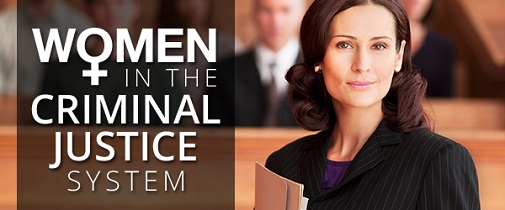Women in the Criminal Justice System

Seeing female police officers, lawyers, corrections officers and judges is a common occurrence these days. However, women working in the criminal justice system is a relatively new trend. It wasn’t long ago that this was quite rare. In fact, in 1872 the Supreme Court ruled against allowing a woman, Myra Bradwell, to practice law. It wasn’t until the 20th century, especially after the middle of the century, that the number of women in law enforcement significantly increased.
According to the National Center for Women and Policing, female police officers doubled in number during the 1950s alone. After that, it was only a matter of time until more women became criminal justice professionals. In 1968, two women in Indianapolis were the first to ever go on patrol duty. And the Civil Rights Act was expanded in the year 1972, stating that women could no longer be discriminated against by police departments. By 1992, half of all law students were women, and as a result more became judges. Now, about 30 percent of trial and district court judges in the United States are women, according to the National Women’s Law Center.
Women Today
According to recent U.S. Census Bureau statistics, employment of women in the criminal justice system is impressive. The following data illustrates the important role that women play in all aspects of law enforcement, the courts, corrections and more. As of the year 2011 (the most recent year for which statistics are available), there are:
- 206,298 women employed as security guards and gaming officers (22 percent)
- 37,224 women who are detectives and criminal investigators (26 percent)
- 9,656 women working as firefighters (3.5 percent)
- 117,015 women employed as bailiffs and correctional officers (27 percent)
- 110,670 women who are police officers and sheriffs (16 percent)
Influential Women in Criminal Justice
Both in the past and present, women have made a difference in the criminal justice field. Below is a list of women who are great role models for individuals who are just starting their criminal justice career. You can follow them on Twitter and Facebook to get updates on the criminal justice field and how they are shaping decisions related to policy and law.
- Sandra Day O’Connor: As the first woman to serve as a United States Supreme Court justice, she was awarded the Presidential Medal of Freedom in 2009. O’Connor served as a justice from 1981 through 2006. When she first became an attorney, she had to work as a secretary because no law firms would hire a woman. O’Connor later served in the Arizona Legislature and Court of Appeals.
- Ruth Bader Ginsburg: She is currently serving as a Supreme Court Justice and was appointed by President Bill Clinton in 1993. After O’Connor, Ginsburg is the second female justice. Her past career highlights include working as an advocate for the advancement of women’s rights and volunteering as a lawyer for the American Civil Liberties Union.
- Janet Reno: She was the first female U.S. attorney general and the longest serving during the 20th century. Reno graduated from Harvard Law School, one of only 16 women in her class of 500. Before serving as attorney general, Reno was state attorney in Miami, Florida.
- Freda Adler: As one of the most influential criminologists in the world, Adler served as president of the American Criminological Society and has been a consultant for the United Nations on issues related to crime. She is currently serving as professor emeritus at Rutgers University and as visiting professor at the University of Pennsylvania.
- Gloria Allred: She is a high-profile American lawyer who generally works on cases related to the protection of women’s rights. Her most famous client was the family of Nicole Brown Simpson during the O.J. Simpson trial. In fact, her law firm handles more women’s rights cases than any other private firm in the U.S.
Criminal Justice at Concordia University Texas
The online Bachelor of Science in Criminal Justice program focuses on the concept of restorative justice, which brings victims and offenders together in an effort to repair communities. Graduates are prepared for career opportunities in probation, parole, state and federal law enforcement and the courts. Learn more about our criminal justice program and discover how a degree from Concordia University Texas can help you make a difference in your community.
